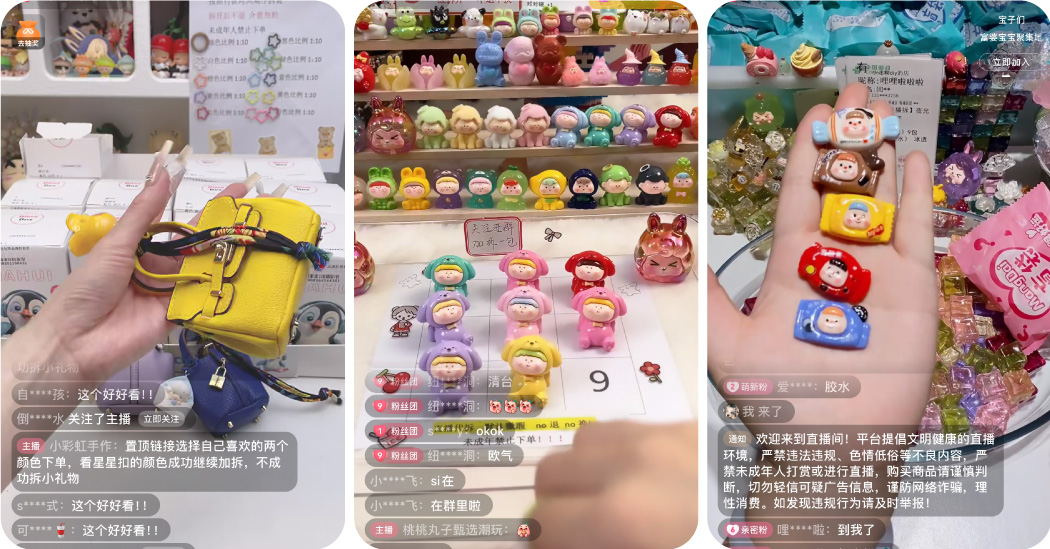Selling products on livestream video is a big business in China. Apps like Douyin, the Chinese sibling of TikTok, mix social media with e-commerce to keep people glued to their phones while purchasing everything from soap to spices to suitcases.
The latest e-commerce trend adds a game of chance to the mix. Known as “blind box livestreaming,” it has become an entertaining and, some users and experts said, addictive pastime. With Chinese consumers slogging through a period of low expectations, blind box livestreams offer the thrill of potentially winning more prizes for a low cost.
Viewers pay small sums of money to buy trinkets that are hidden in small bags – the “blind box.” The seller unpacks the blind boxes on a livestream while the buyer and audience watch. Based on what is inside, players may receive another bag and another chance to win. The seller coos when the player gets a lucky draw, and viewers cheer in the comments.
One bag after another, the game goes on. Here’s how it typically works:
When it’s your turn, the streamer randomly draws the amount of blind boxes you ordered — in this case, six.
You and everyone watches as the seller starts to open them on camera and places them on a grid.
You win an additional bag if the lucky color you have designated is drawn, in this case pink, or if a lucky stone falls from the bag.
Lucky you, you’ve gotten both. So now you get two more figurines than you ordered.
If there are certain patterns or pairs, like in slot machines, you can win additional figurines.
You now are up to 12. There are no more patterns, and the game is set to end.
But the streamer decides to add a bonus bag to keep the game going. It creates another pair, so you win another.
You end up with these 14 figures, even though you paid for six.
Many products are billed as collectable but in practice are simply decorative. Most importantly, they are cheap. For a little over $1 — and rarely more than $10 — a livestream viewer can buy a few bags and start playing.
The toys and other items included in blind boxes started gaining popularity about five years ago. They first were sold online and in brick-and-mortar stores; the sale of them in gamified livestreams is a recent innovation. Now virtually all of China’s top social media platforms that allow e-commerce are offering blind box livestreaming. Popular streams can bring in tens of thousands of viewers in one night. One streamer told Chinese news media that she makes an average daily profit of 800 renminbi, about $110, well above the national average salary.
The prevalence of blind box livestreaming speaks to the state of China’s economy, which is suffering through an extended period of abysmal consumer confidence and repressed spending.
“People are looking for alternative ways to engage in the consumption economy without a huge hit to their wallets,” said Ivy Yang, an e-commerce analyst and founder of the communication agency Wavelet Strategy. “You want to have something that is kind of a cheap thrill.”
Players said the process can be exhilarating. Interacting with the streamer and other viewers can offer a sense of community.
But some people can’t stop playing – what seemed like a bargain can end up being costly. Xu Wangwang, 28, a legal assistant in China’s eastern Jiangsu Province, had played the game regularly for five months until stopping in July. She was spending an average of 3,000 renminbi, about $420, every month, about one-third of her salary.
“I regret it so much,” Ms. Xu lamented. “I could have done anything with this money.”
Ms. Xu’s toy collection. Courtesy of Xu Wangwang.
Trinkets identical to the ones bought on blind box livestreams are usually cheaper if purchased directly on Taobao, one of China’s biggest e-commerce sites. But the experience is not the same. “Buying directly from online stores doesn’t offer the same emotional value,” Ms. Xu said, “I can feel my adrenaline skyrocketing when the streamer unseals the bag.”
Ivy Sun, who lives in China’s southwestern Yunnan Province, has made friends with other buyers. They sometimes play together. “It’s more interactive,” she said, adding that she has spent about $2,800 on more than 400 games since June.
Quan Hongchan, 17, an Olympic diver, appeared on a blind box livestream the day before she won a gold medal at the Paris Games in August. A week later she showed off her toy collection in a post on Douyin that has since been deleted.
“Consumers need time to adapt and return to reason, but in the beginning, they get into a frenzy,” said Qunfang Wu, a researcher studying human-computer interaction at the Berkman Klein Center for Internet and Society at Harvard University.
The potential for consumers to get hooked on blind boxes has caught the attention of the Chinese government, which bans gambling in the mainland except for state-run lotteries. Last year, the authorities issued guidelines regulating blind box sales, including a prohibition on underage players and requirements that sellers disclose the chances of winning.
Meanwhile, gamified livestreams are taking the craze to a new level.
No other country has embraced e-commerce livestreams like China, and while blind box livestreaming may be the big thing in China now, it may not be for long.
“Something more fun will appear,” said Ms. Wu of Harvard. “Everyone will follow it.”
Checkout latest world news below links :
World News || Latest News || U.S. News
The post China’s Latest Livestream Sensation: Shopping With a Game of Chance appeared first on WorldNewsEra.

